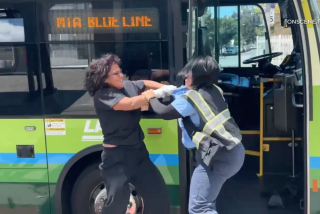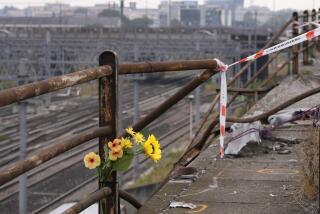Caution on Countries With Poor Highway Safety Rates : Transportation: A U.S.-based group seeks boycotts on nations it deems unsafe. One tourism official calls the charges unfair.
- Share via
On May 3, a bus carrying Aron Sobel, 25, a fourth-year medical student from Potomac, Md., skidded off a narrow, winding road on Turkey’s Aegean Coast and plunged into a deep ravine. Sobel, who was vacationing, was killed, along with 21 other passengers. Local newspaper accounts quoted survivors as saying passengers had pleaded with the driver to slow down before the accident, which happened on a dangerous curve that has been the site of other crashes.
Sobel’s death prompted his parents, Solomon and Rochelle Sobel, to form the Assn. for Safe International Road Travel (ASIRT), with the aim of warning travelers about highway safety hazards in Turkey and other popular tourist destinations abroad. As Rochelle Sobel, an elementary school teacher, explains, the group hopes to persuade vacationers to avoid countries where highways are dangerous until they adopt effective safety measures. Loss of tourism revenue, she believes, may prompt at least some governments to act.
For the record:
12:00 a.m. Dec. 10, 1995 For the Record
Los Angeles Times Sunday December 10, 1995 Home Edition Travel Part L Page 6 Travel Desk 1 inches; 34 words Type of Material: Correction
Highway safety--Due to an editing error, the Dec. 3 Travel Insider column (“Caution on Countries With Poor Highway Rates”) incorrectly equated 100 million kilometers and 6.2 million miles; 100 million kilometers equals 62 million miles.
With an active membership of about 30 and hundreds of supporters, ASIRT has assembled statistics from international organizations, including the United Nations, that strongly suggest that travel by bus and car in some countries is far more perilous than in others. In Turkey, 21 people are killed in traffic accidents for every 100 million kilometers (6,200,000 miles) of vehicle travel, Sobel says; in the United States, the comparable rate is 1.1 persons. In Kenya, the figure is 38; in Egypt, 40.
Citing tour guides as her source, Sobel contends that speeding, tailgating, passing on hills and curves and other unsafe driving practices are rampant in Turkey--a charge called “unfair” by Mustafa Siyahhan, director of the Turkish Government Tourist Office in Washington. Every nation has good drivers and bad, he insists. To generalize “is wrong.” Turkey has expressed its condolences to the Sobels.
Turkey isn’t the only nation targeted for a tourist boycott as a result of a highway accident. A Los Angeles law firm representing relatives of six Americans killed in a tour bus crash on the road from Cancun to the Mayan ruins of Chichen Itza in Mexico are calling for a boycott of Cancun until survivor insurance benefits are paid.
In the Jan. 3, 1993, accident, a tour bus filled with 54 tourists “swerved to avoid a car and overturned, slamming into a high voltage electricity transformer,” according to a statement issued by the law offices of Kananack, Murgatroyd, Baum & Hedlund. Twenty-five people, including 18 Americans, were killed. Everyone else suffered injuries. Mexican authorities reportedly have blamed the accident on the driver’s “excessive speed and a lack of caution.” The driver is believed to have fled the scene and has not been found. An insurance benefit of about $5,000 per victim remains unpaid despite numerous efforts to collect it from the bus company’s insurer, says William J. Downey, spokesman for the law firm.
These two well-publicized crashes serve as a reminder to travelers that attention to safety concerns can be lax in other nations. Many Americans return from trips abroad citing erratic driving habits, poor road conditions and other highway hazards they have encountered. And I am among these travelers.
Over the years, I have explored much of Europe, and on a return visit to Portugal a few years back I concluded that that nation suffers some of the most aggressively unsafe drivers on the Continent. Speeding, tailgating and passing on hills and curves seemed the rule rather than the exception that they are in this country. Twice, impatient drivers zipped between me and the car I was passing--in effect, putting three vehicles abreast on a two-lane road. I was flabbergasted; I’ve never witnessed this anywhere else.
In contrast, I spent a week in April circling Northern Ireland by car, and I was impressed by the good-mannered courtesy of most of the drivers I saw. In Portugal, eight people are killed in traffic accidents for every 100 million kilometers of vehicle travel, according to ASIRT statistics. In Ireland, the rate is two.
In 1972, I crossed Afghanistan on a series of mostly beat-up inter-city buses. Between Kandahar and Kabul, the bus proved so old and worn that part of the flooring had worn away. I could see the pavement below as we sped through the desert. To escape exhaust fumes, I climbed to the top of the bus and rode with the baggage. On steep downhill grades in the mountains, the driver shut off the motor and coasted to save gas. Did the Afghanistan government regularly inspect the nation’s heavily used buses for safety hazards? Had the driver undergone safety training? I doubt it. Many Third World nations do not have the financial resources for safety inspections.
So what is a traveler who wants to explore the world by bus or car to do?
ASIRT has taken a very positive step by raising the issue of highway hazards abroad. Whether you support a boycott of the countries it considers dangerous is a matter of personal choice. But at the very least, more people will be made aware of the dangers. Thus alerted, they can exercise caution--whether they are at the wheel themselves or choosing a bus line on which to book a seat.
More to Read
Sign up for Essential California
The most important California stories and recommendations in your inbox every morning.
You may occasionally receive promotional content from the Los Angeles Times.










